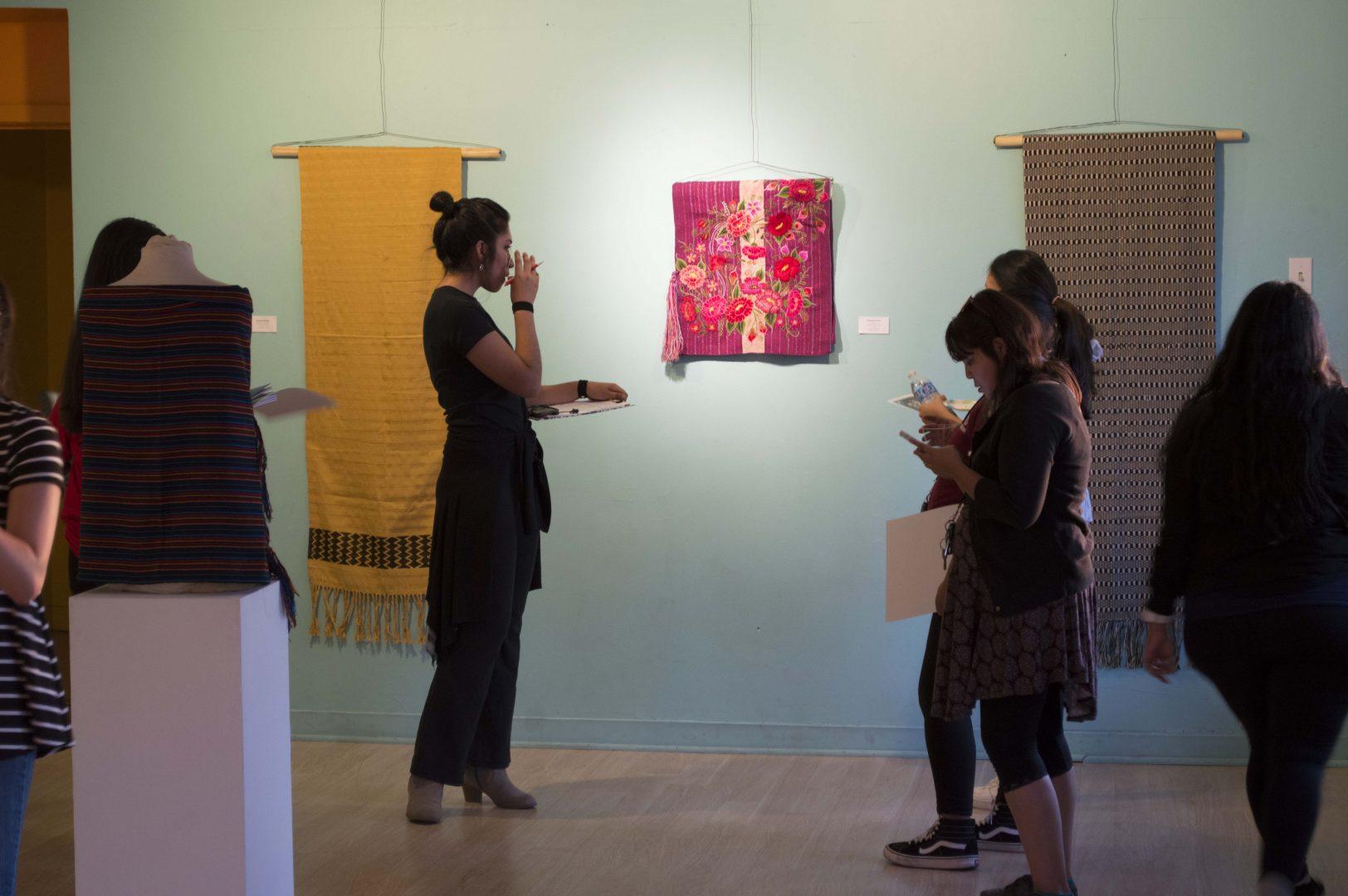Fresno has the opportunity this entire week to learn about an intricate part of Mexican culture, the rebozo.
The weeklong “Rebozo Revival Festival” began with an opening ceremony Monday night at Fres.Co where various selections of the rebozo, or “Mexican shawl,” and the weavers were showcased.
Attendees were offered a display of numerous rebozos along with light snacks.
Lourdes Sevilla, the Festival’s founder and current committee member, said rebozos are usually worn by indigenous women and their uses range from carrying a baby, a large bundle or using it as a scarf.
The festival, which continues with different rebozo-themed activities daily until Friday, was put together by a number of individuals and organizations, some Fresno State affiliated.
Sevilla said she has been hosting events similar to this festival since 1998.
“The name, Rebozo Revival, [means] to bring it back again,” Sevilla said. “This is the reason I do these events, because people come and they see what a rebozo is and not only that, they learn the culture, the history and the very wide meaning that the rebozo has.”
Sevilla explained that the rebozo varies in textiles, colors and designs depending on the region in which it is crafted. She explained how some regions exclusively use silk, while others use cotton.
At the ceremony, four weavers from two regions of Mexico were asked to be part of the event to showcase how rebozos can change stylistically throughout their native country.
“No two rebozos are going to be the same,” Sevilla said.
And with tears, she described the rebozo as “the most beloved garment that there is in Mexico.”
Sevilla’s passion for rebozos comes from her grandfather, who was a weaver of tablecloths and napkins, she said.
“I think my love for textiles and rebozos, particularly, was born right there,” Sevilla said. “And after seeing how my grandfather would create something from very simple threads, to me that was a fascination and it stayed in my heart.”
Edgar Manriquez, social work and folklórico instructor at Fresno Pacific University, said he brought his folklórico class to the display to show them how significant the rebozos are to the dances they practice.
“I want them to learn and see the different designs in rebozos because, in the future, they will be using rebozos for the folklórico class,” Manriquez said. “But I didn’t think it was going to be this detailed. It’s pretty good. It’s amazing.”
He added, “I like the colors, the designs, the different patterns of how to tie the rebozos.”
The audience turned its attention to the opening ceremony, which placed a spotlight on the four “master weavers.” Sevilla introduced each woman individually, giving the audience their names, their homes and their backstories.
The craftswomen were provided with visas to travel and were flown in from two regions of Mexico.
“This program is incomplete without the master weavers,” Sevilla said during the opening ceremony. “When I cannot show these people’s work, my mission is incomplete.”
The four weavers were Fidencia Ventura Salazar and Luisa Govea Cruz of Santa MarÃa del RÃo, San Luis PotosÃ; and Maria Yolanda Hernandez Gomez and Juana Bernarda Hernandez Gomez of Zinacantán, Chiapas.
“I feel very grateful for the invitation I received,” Cruz said. “To everyone that sponsors these events — a thousand thank yous.”
The weavers were smiling from ear-to-ear throughout the entire night. Maria Yolanda Hernandez Gomez explained the reason behind her and her fellow weavers’ joy.
“I feel happy because it’s a dream that we have as women, but I think it’s bigger because few women can travel because many women in the place where I live are always at home,” she said. “It’s difficult to come here because of the visa and other things, but I’m happy because I can show my other partners that we can go abroad and we can dream.”
The festivities continued Tuesday at the Holistic Cultural and Education Wellness Center, including storytelling conducted by the weavers. The stories revolved around the rebozos and the meaning behind them.
A rebozo fashion show will be hosted at Fresno State’s North Gym on Wednesday from 6 to 8 p.m.
On Thursday, the weavers will let the audience get a taste of what it is like to weave a rebozo through two workshops. The first is from 10 a.m. to noon and the second is from 2 to 4 p.m., in Room 3212 of the Henry Madden Library.
Finally, the festival’s curtains will close on Friday after a closing reception that will go from 6 to 8 p.m. at the Mexican Consulate in north Fresno at 7435 N. Ingram Ave.
The Rebozo Revival Festival is co-sponsored by Fresno State’s Center for Creativity and the Arts; College of Social Sciences and College of Arts and Humanities; the departments of anthropology, modern and classical languages and literatures; and the Cross Culture and Gender Center’s Latino/a programs and services.
Community partners are Fres.Co, Dulce Upfront, Holistic Cultural and Wellness Education Center and the Mexican Consulate-Fresno.
For more photos, clickhere:
https://fscollegian.com/2017/09/26/revival-of-the-rebozorenacimiento-del-rebozo/




